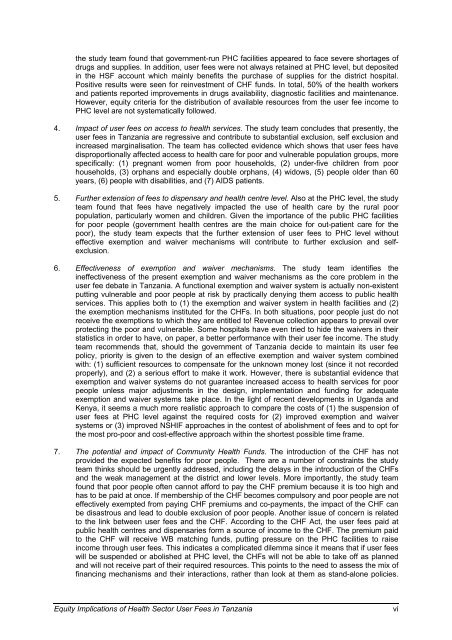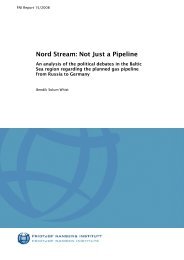equity implications of health sector user fees in tanzania
equity implications of health sector user fees in tanzania
equity implications of health sector user fees in tanzania
Create successful ePaper yourself
Turn your PDF publications into a flip-book with our unique Google optimized e-Paper software.
the study team found that government-run PHC facilities appeared to face severe shortages <strong>of</strong><br />
drugs and supplies. In addition, <strong>user</strong> <strong>fees</strong> were not always reta<strong>in</strong>ed at PHC level, but deposited<br />
<strong>in</strong> the HSF account which ma<strong>in</strong>ly benefits the purchase <strong>of</strong> supplies for the district hospital.<br />
Positive results were seen for re<strong>in</strong>vestment <strong>of</strong> CHF funds. In total, 50% <strong>of</strong> the <strong>health</strong> workers<br />
and patients reported improvements <strong>in</strong> drugs availability, diagnostic facilities and ma<strong>in</strong>tenance.<br />
However, <strong>equity</strong> criteria for the distribution <strong>of</strong> available resources from the <strong>user</strong> fee <strong>in</strong>come to<br />
PHC level are not systematically followed.<br />
4. Impact <strong>of</strong> <strong>user</strong> <strong>fees</strong> on access to <strong>health</strong> services. The study team concludes that presently, the<br />
<strong>user</strong> <strong>fees</strong> <strong>in</strong> Tanzania are regressive and contribute to substantial exclusion, self exclusion and<br />
<strong>in</strong>creased marg<strong>in</strong>alisation. The team has collected evidence which shows that <strong>user</strong> <strong>fees</strong> have<br />
disproportionally affected access to <strong>health</strong> care for poor and vulnerable population groups, more<br />
specifically: (1) pregnant women from poor households, (2) under-five children from poor<br />
households, (3) orphans and especially double orphans, (4) widows, (5) people older than 60<br />
years, (6) people with disabilities, and (7) AIDS patients.<br />
5. Further extension <strong>of</strong> <strong>fees</strong> to dispensary and <strong>health</strong> centre level. Also at the PHC level, the study<br />
team found that <strong>fees</strong> have negatively impacted the use <strong>of</strong> <strong>health</strong> care by the rural poor<br />
population, particularly women and children. Given the importance <strong>of</strong> the public PHC facilities<br />
for poor people (government <strong>health</strong> centres are the ma<strong>in</strong> choice for out-patient care for the<br />
poor), the study team expects that the further extension <strong>of</strong> <strong>user</strong> <strong>fees</strong> to PHC level without<br />
effective exemption and waiver mechanisms will contribute to further exclusion and selfexclusion.<br />
6. Effectiveness <strong>of</strong> exemption and waiver mechanisms. The study team identifies the<br />
<strong>in</strong>effectiveness <strong>of</strong> the present exemption and waiver mechanisms as the core problem <strong>in</strong> the<br />
<strong>user</strong> fee debate <strong>in</strong> Tanzania. A functional exemption and waiver system is actually non-existent<br />
putt<strong>in</strong>g vulnerable and poor people at risk by practically deny<strong>in</strong>g them access to public <strong>health</strong><br />
services. This applies both to (1) the exemption and waiver system <strong>in</strong> <strong>health</strong> facilities and (2)<br />
the exemption mechanisms <strong>in</strong>stituted for the CHFs. In both situations, poor people just do not<br />
receive the exemptions to which they are entitled to! Revenue collection appears to prevail over<br />
protect<strong>in</strong>g the poor and vulnerable. Some hospitals have even tried to hide the waivers <strong>in</strong> their<br />
statistics <strong>in</strong> order to have, on paper, a better performance with their <strong>user</strong> fee <strong>in</strong>come. The study<br />
team recommends that, should the government <strong>of</strong> Tanzania decide to ma<strong>in</strong>ta<strong>in</strong> its <strong>user</strong> fee<br />
policy, priority is given to the design <strong>of</strong> an effective exemption and waiver system comb<strong>in</strong>ed<br />
with: (1) sufficient resources to compensate for the unknown money lost (s<strong>in</strong>ce it not recorded<br />
properly), and (2) a serious effort to make it work. However, there is substantial evidence that<br />
exemption and waiver systems do not guarantee <strong>in</strong>creased access to <strong>health</strong> services for poor<br />
people unless major adjustments <strong>in</strong> the design, implementation and fund<strong>in</strong>g for adequate<br />
exemption and waiver systems take place. In the light <strong>of</strong> recent developments <strong>in</strong> Uganda and<br />
Kenya, it seems a much more realistic approach to compare the costs <strong>of</strong> (1) the suspension <strong>of</strong><br />
<strong>user</strong> <strong>fees</strong> at PHC level aga<strong>in</strong>st the required costs for (2) improved exemption and waiver<br />
systems or (3) improved NSHIF approaches <strong>in</strong> the contest <strong>of</strong> abolishment <strong>of</strong> <strong>fees</strong> and to opt for<br />
the most pro-poor and cost-effective approach with<strong>in</strong> the shortest possible time frame.<br />
7. The potential and impact <strong>of</strong> Community Health Funds. The <strong>in</strong>troduction <strong>of</strong> the CHF has not<br />
provided the expected benefits for poor people. There are a number <strong>of</strong> constra<strong>in</strong>ts the study<br />
team th<strong>in</strong>ks should be urgently addressed, <strong>in</strong>clud<strong>in</strong>g the delays <strong>in</strong> the <strong>in</strong>troduction <strong>of</strong> the CHFs<br />
and the weak management at the district and lower levels. More importantly, the study team<br />
found that poor people <strong>of</strong>ten cannot afford to pay the CHF premium because it is too high and<br />
has to be paid at once. If membership <strong>of</strong> the CHF becomes compulsory and poor people are not<br />
effectively exempted from pay<strong>in</strong>g CHF premiums and co-payments, the impact <strong>of</strong> the CHF can<br />
be disastrous and lead to double exclusion <strong>of</strong> poor people. Another issue <strong>of</strong> concern is related<br />
to the l<strong>in</strong>k between <strong>user</strong> <strong>fees</strong> and the CHF. Accord<strong>in</strong>g to the CHF Act, the <strong>user</strong> <strong>fees</strong> paid at<br />
public <strong>health</strong> centres and dispensaries form a source <strong>of</strong> <strong>in</strong>come to the CHF. The premium paid<br />
to the CHF will receive WB match<strong>in</strong>g funds, putt<strong>in</strong>g pressure on the PHC facilities to raise<br />
<strong>in</strong>come through <strong>user</strong> <strong>fees</strong>. This <strong>in</strong>dicates a complicated dilemma s<strong>in</strong>ce it means that if <strong>user</strong> <strong>fees</strong><br />
will be suspended or abolished at PHC level, the CHFs will not be able to take <strong>of</strong>f as planned<br />
and will not receive part <strong>of</strong> their required resources. This po<strong>in</strong>ts to the need to assess the mix <strong>of</strong><br />
f<strong>in</strong>anc<strong>in</strong>g mechanisms and their <strong>in</strong>teractions, rather than look at them as stand-alone policies.<br />
Equity Implications <strong>of</strong> Health Sector User Fees <strong>in</strong> Tanzania vi













